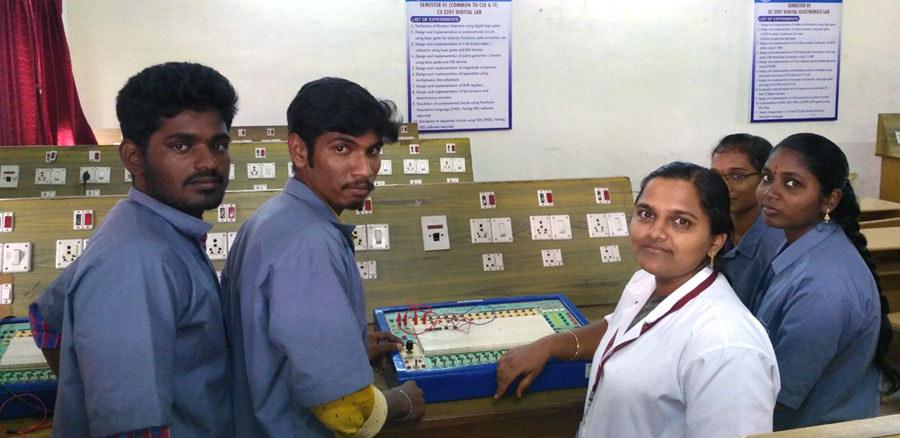
M.E - APPLIED ELECTRONICS
About the Course
M.E Applied Electronics has been introduced in the Department of Electronics and Communication Engineering in the year 2008. This post graduate program in Applied Electronics transforms graduate engineers to high-quality technical professionals and research scholars who can meet the requisite requirement of educational institutes, R & D organizations, and electronics industry. The post graduates would have acquired knowledge to apply in the development of embedded systems, wireless networks, VLSI designs, and allied technologies, and will also be fully equipped to take up research in related and interdisciplinary areas.
The Department has software to cater to the needs of student’s projects and R&D activities. In order to compete with rival companies or just remain a step ahead of them, the designers of technical systems & innovative products must be fully aware of both the usage & the limitations of electronic components & systems.
Modern teaching aids are used for enhancing the quality of teaching. The students are exposed to the practical and industrial aspects of the subjects through laboratory works and periodic industrial visits. The students are encouraged to participate and present technical papers in National, International conferences and publish them in various journals.
Subjects usually studied under this degree are Neural Networks, Advanced Digital Signal Processing, VLSI Design, Applied Mathematics for Engineering, Digital Control Engineering, Analysis and Design of Analog Integrated Circuits, Computer Architecture, Parallel Processing, ASIC Design, Design and Analysis of Algorithms, Digital Image Processing, Reliability Engineering, Robotics, VLSI Signal Processing, Internet Multimedia, Electromagnetic Interference, System Design, Communication Networks etc.
Duration
This is a two year program to which students are admitted based on their performance in the Common entrance test. The program requires students to take over three semesters of course work, including 28 credits of core courses, 4 credits of laboratory courses, and 18 credits of elective courses. In addition, there is a Masters project that the students carry out over a period of almost two semesters. The M.E. project is stringently evaluated at three stages, a thesis is an essential requirement, and often the work leads to publications.
Basic Eligibility
The eligibility criteria for pursuing a master’s degree are holding a bachelor's degree in B.E/B.Tech or any other equivalent branches of engineering.
Employability
Electronics and Communication post-graduates have tremendous employment opportunities in research, design, development, manufacturing, testing, quality assurance, system integration and commissioning, in allied industries of Telecommunications – Mobile, Wireless, Broadband, Optical, Satellite, Signal processing and computing, Embedded System design, VLSI design, Hardware design and testing, Bio-medical instrumentation, Software development and testing.
Faculty
Qualified faculty members assigned with various theory subjects prepare course plans using the standard format provided by the institute with emphasis on 'learning' of the students. The lectures lay emphasis on the knowledge content, utility value - application in real life and recent developments. The classroom sessions will be interactive and will encourage the students to think independently and inspire their creativity. The faculty will ensure that the students in the class have assimilated the content projected. High level of discipline will be maintained in the classroom.

 ISky
ISky